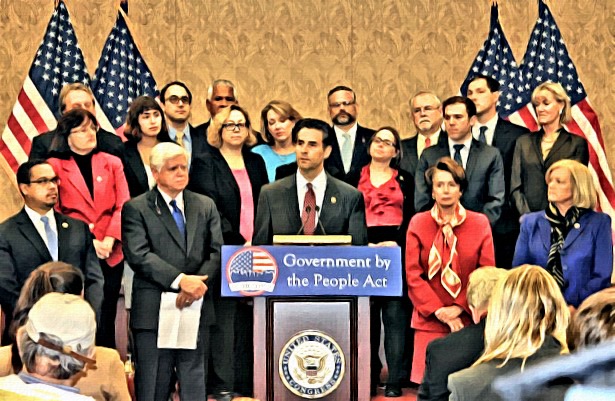Nancy Pelosi’s wish came true; one-party control of the federal government. Ever the self-serving Democrat, her first act (HR1) was a wish for more wishes (single-party control forever). Thus, Pelosi is forcing every member of her caucus to co-sponsor House of Representatives Bill Number 1 to “fix” future elections the way Kathy Boockvar (D-PA), fixed the 2020 presidential election in Pennsylvania. In short, HR1 federalizes elections.
HR1, is called “The For The People Bill” by John Sarbanes (D-MD), who wrote the bill to keep partisan gerrymandering, lobbyists, and election security out of all 50 states. His for-public-consumption reason is free and fair elections for every American. In reality, Sarbanes is exporting to all states what worked in 2020 for Democrats in blue states; changes he claims “aren’t controversial reforms” (to ward off controversial GOP edits).
HR1’s definition of “free” is 100% controversial. The bill forces 50 states to auto-register names on state and federal databases; thereby giving many aliens voting rights. It also requires 50 states to allow felons to vote the day they are released from prison. In a close-election year, blue states can add illegal aliens to welfare roles, and Democrat governors can pardon thousands of drug felons, to create eligible voters. Nothing like putting party before we the people.
HR1 is an incentive for bad government. Pre-registering aliens and felons to defeat presumptive winners invites controversial election outcomes. Did Democrats learn nothing on January 6th? If entitlements for non-citizens aid re-election, what happens to the welfare state? If pardoning felons aids re-election, what happens to crime rates? Ahem, taxpayers get soaked and poor communities become less safe. But at least Joe Biden is stopping the malarkey!
The GOP’s goal is to ensure “fair” elections are the order of the day. To the thinking man or woman, 100% voter turnout is not synonymous with fairness. Is it fair that felons, who won’t obey the law, choose the lawmakers? Is it fair that un-documented aliens, who unlawfully entered the USA, dilute the vote of a naturalized citizen? Is it fair that citizens, who won’t get a photo ID, simply sign an identity-promise on Election Day – – and get to vote?
The “fairness” issue revolves around the principle of one man (person), one vote, because Republicans have learned – at least since Democrat fraud in Illinois and Texas elected JFK – close elections can be stolen. In our participatory democracy, citizens “participate” by registering to vote with their state, collecting and having proof of their identity, and going to the polls on Election Day. It’s no harder than registering for classes in public high school or getting a job.
But HR1 rules voters don’t have to show a photo ID or have their eligibility and qualifications checked by election officials. It includes vague language that can be used to criminally charge poll workers who question a voter’s eligibility. It encourages “ballot harvesting” by mandating no-fault absentee ballots that must be accepted ten days after Election Day. It requires states to permit 16-year-olds to register (wink-wink: with no photo ID requirement, the underage can easily vote).
The diva of spurious elections, Stacey Abrams (D-GA) claims HR1 gives minorities “our seat at the table and our place at the ballot box” – which could also be done by providing photo IDs to 4,048,200 black Americans (that lack a government-issued photo ID). The Federal government enrolled 8,019,763 in Obamacare in 2014, so it can surely distribute 4 million photo IDs (also needed to board airplanes and enter government buildings).
The sad fact is most of the “great ideas” in HR1 have already been rejected by England, France, Germany, and the Netherlands because they invited too much fraud and voting-day confusion. The guess here is HR1 passes the House and comes close in the Senate, but don’t expect Democrats to stop trying.
